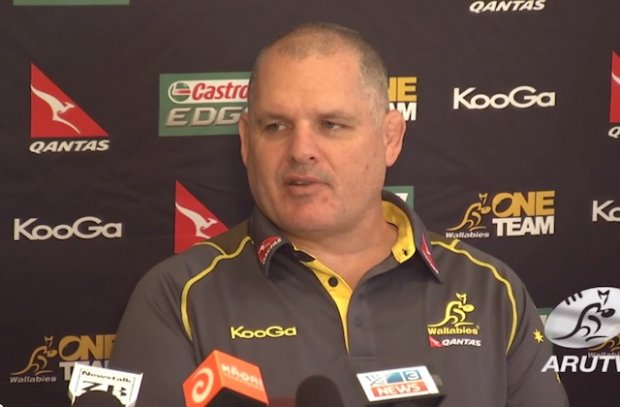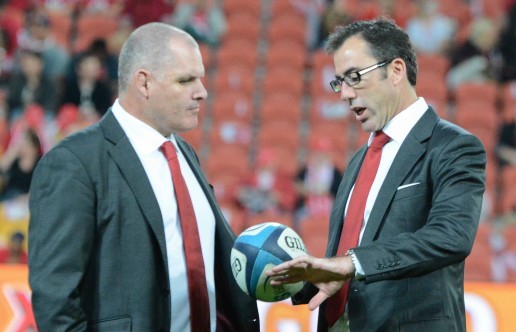Listening to Alan Jones speak in the doco “Rise & Rise of Aust Rugby – The Grand Slam” a few years back, he made a very interesting point about core coaching philosophy.
His idea was to make the fundamental choice to either pick cattle or pick a game plan. He chose to select a game plan first and foremost – or a core game plan with a small number of closely related variations based on clear ideas on the sort of game you want to play married to close analysis of opponents to identify avenues of opportunity – that achieve what you want it to.
Then you select players who will deliver that game plan. Apparently this is what drove him to reinvigorate Steve Cutler (previously marked “do not pick”) and chase after Topo as he wanted an attacking lineout and an attacking scrum.
Alternatively, it can be validly argued Bob Dwyer seems to bat for the other side in that he picked simply the best players available as he saw them (often over positional specialists – note including Cody over Miller at the RWC and of course the Ella situation) and built a game around their strengths. This is aligned to his often quoted ideas on “a good big fella will beat a good little fella” and his core concept of simply making sure you have 5 world class players in the team somewhere. He picked cattle first.
Jonesism vs Dwyerism
So we have two competing philosophies – game plan vs cattle plan. Or “Jonesism” vs “Dwyerism”.
At this point it is probably sensible to acknowledge that neither approach is pure. I am not arguing absolutes and there are clearly instances where each philosophy (and indeed each coach) borrowed elements from the other approach. However I do not think anyone can rationally argue against that each guy generally came from opposite ends of the cattle vs game-plan spectrum as the starting point of their philosophy.
Following the point through, Dingo was clearly a guy who selected players first and foremost and then fitted them into a team. it could even be validly argued he did this with no overly clear game plan (“play what’s in front of you”). His philosophy was demonstrably more Dwyerism than Jonesism.
It is interesting that Link has appeared to have tried to do both. Especially at the Reds he clearly had different game plans for different opponents (Jonesism) and he would tinker with his side accordingly. But that tinkering was to change game-plan based on the same cattle (Dwyerism). Lately he has been more into picking the best generalist (and fit) cattle available and fitting them into a team with one core game-plan with minor deviations (Dwyerism).
I am not sure which approach is better. My gut tells me Jonesism is better. In the business world you design a business model with functions or jobs within that then find someone to do that job – not the other way around. Alternatively in the supply arena you apply the Porters ideals to identify a niche or demand or place of opportunity (game plan) then source a product/offer to fit that demand – not the other way around.
The score board
Is either approach demonstrated as better? The best test of this is success. So a brief look at the other World Cup winning coaches is insightful:
1. Brian Lochore – Dwyerism
2. Bob Dwyer – Dwyerism (duh…)
3. Kitch Christie – Jonesism
4. Rod McQueen – a little contentious but I would say Jonesism (so 75% Jones)
5. Clive Woodward – Jonesism
6. Jake White – Jonesism
7. Graham Henry – a little contentious but I would say Jonesism (so 75% Jones)
Note – ok, Jones didn’t win a World Cup. But he did win a Grand Slam – the World Cup of the time – and he did it as the first Wobbly coach to do so. Surely a notable achievement.
Another interesting coach or success point to consider is Cheks and the Super title. Clearly Super is not a RWC, but it is relevant to the Australian perspective of “a successful coach”. And Cheks clearly is Links biggest current rival to the Wobblies job. So it is pertinent to acknowledge that he is clearly a devotee of the Jones idea of game plan over cattle.
So we could say of the 7 RWC winning coaches above, at the most Dwyer-generous the score is 2.5 vs 4.5 (2 Dwyer vs 3 Jones & the 2 weighted votes). Then if we include Cheks, the Jones victory is even more clear. Either way Jones got up. So it would appear both by weight of numbers and perhaps even more tellingly by the more recent success of Jones vs Dwyer approaches, the concept of picking a core game plan over a core group of players has a greater probability of RWC success.
Make your mind up time
And herein is the conundrum. Link has tried to be both. And he has not achieved the level of success demanded/expected.
Furthermore I do not think the two models can exist simultaneously and succeed.
So I think Link is getting to a point where he needs to crystalise his core philosophy and refine that. At the moment, from the outside looking in, it appears we are trying to be jack of both trades and mastering none.
I say again I am not convinced which model is better, although the evidence suggests that whilst both models has resulted in World Cup success, Jonesism is a more successful philosophy.
But of more importance, the current “bet each way” is not working and to continue doing the same thing and expect a different outcome is one definition of madness.
Your assignment – should you chose to accept it – is to consider the above and discuss. Does Links approach lack a clear philosophy? Which approach is better? Which approach should Link apply or can he continue to have a bit of both?




